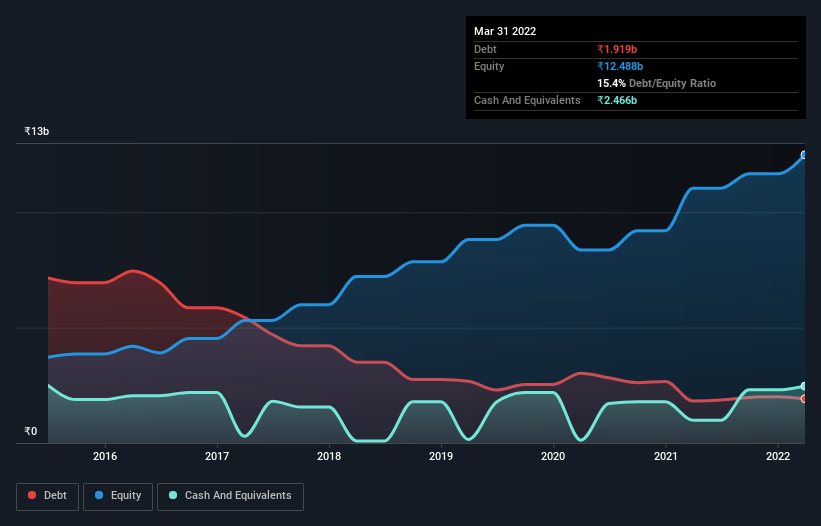Venky's (India) (NSE:VENKEYS) Has A Pretty Healthy Balance Sheet

Some say volatility, rather than debt, is the best way to think about risk as an investor, but Warren Buffett famously said that 'Volatility is far from synonymous with risk.' It's only natural to consider a company's balance sheet when you examine how risky it is, since debt is often involved when a business collapses. Importantly, Venky's (India) Limited (NSE:VENKEYS) does carry debt. But the real question is whether this debt is making the company risky.
When Is Debt A Problem?
Debt is a tool to help businesses grow, but if a business is incapable of paying off its lenders, then it exists at their mercy. Part and parcel of capitalism is the process of 'creative destruction' where failed businesses are mercilessly liquidated by their bankers. While that is not too common, we often do see indebted companies permanently diluting shareholders because lenders force them to raise capital at a distressed price. Of course, plenty of companies use debt to fund growth, without any negative consequences. The first thing to do when considering how much debt a business uses is to look at its cash and debt together.
Check out our latest analysis for Venky's (India)
How Much Debt Does Venky's (India) Carry?
As you can see below, at the end of March 2022, Venky's (India) had ₹1.92b of debt, up from ₹1.82b a year ago. Click the image for more detail. However, it does have ₹2.47b in cash offsetting this, leading to net cash of ₹546.7m.

A Look At Venky's (India)'s Liabilities
According to the last reported balance sheet, Venky's (India) had liabilities of ₹6.41b due within 12 months, and liabilities of ₹563.4m due beyond 12 months. On the other hand, it had cash of ₹2.47b and ₹6.40b worth of receivables due within a year. So it actually has ₹1.89b more liquid assets than total liabilities.
This short term liquidity is a sign that Venky's (India) could probably pay off its debt with ease, as its balance sheet is far from stretched. Simply put, the fact that Venky's (India) has more cash than debt is arguably a good indication that it can manage its debt safely.
The modesty of its debt load may become crucial for Venky's (India) if management cannot prevent a repeat of the 31% cut to EBIT over the last year. When it comes to paying off debt, falling earnings are no more useful than sugary sodas are for your health. There's no doubt that we learn most about debt from the balance sheet. But it is Venky's (India)'s earnings that will influence how the balance sheet holds up in the future. So if you're keen to discover more about its earnings, it might be worth checking out this graph of its long term earnings trend.
But our final consideration is also important, because a company cannot pay debt with paper profits; it needs cold hard cash. While Venky's (India) has net cash on its balance sheet, it's still worth taking a look at its ability to convert earnings before interest and tax (EBIT) to free cash flow, to help us understand how quickly it is building (or eroding) that cash balance. Looking at the most recent two years, Venky's (India) recorded free cash flow of 30% of its EBIT, which is weaker than we'd expect. That weak cash conversion makes it more difficult to handle indebtedness.
Summing up
While it is always sensible to investigate a company's debt, in this case Venky's (India) has ₹546.7m in net cash and a decent-looking balance sheet. So we don't have any problem with Venky's (India)'s use of debt. When analysing debt levels, the balance sheet is the obvious place to start. But ultimately, every company can contain risks that exist outside of the balance sheet. For instance, we've identified 3 warning signs for Venky's (India) that you should be aware of.
Of course, if you're the type of investor who prefers buying stocks without the burden of debt, then don't hesitate to discover our exclusive list of net cash growth stocks, today.
New: Manage All Your Stock Portfolios in One Place
We've created the ultimate portfolio companion for stock investors, and it's free.
• Connect an unlimited number of Portfolios and see your total in one currency
• Be alerted to new Warning Signs or Risks via email or mobile
• Track the Fair Value of your stocks
Have feedback on this article? Concerned about the content? Get in touch with us directly. Alternatively, email editorial-team (at) simplywallst.com.
This article by Simply Wall St is general in nature. We provide commentary based on historical data and analyst forecasts only using an unbiased methodology and our articles are not intended to be financial advice. It does not constitute a recommendation to buy or sell any stock, and does not take account of your objectives, or your financial situation. We aim to bring you long-term focused analysis driven by fundamental data. Note that our analysis may not factor in the latest price-sensitive company announcements or qualitative material. Simply Wall St has no position in any stocks mentioned.
About NSEI:VENKEYS
Venky's (India)
Primarily engages in the production and sale of poultry products in India and internationally.
Flawless balance sheet with solid track record and pays a dividend.
Market Insights
Community Narratives




